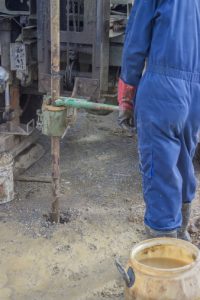Considering the Tensile Strength of Concrete

You might know the tensile strength of water. But everything has a tensile strength, including concrete.
You might know the tensile strength of water. But everything has a tensile strength, including concrete. By calculating what that is, you could conceivably make your construction site safer for everyone who needs to be on it, and not just your workers and office staff.
What is Tensile Strength?
The tensile strength of something is its unique ability to resist the effects of stretching and breaking. But this only applies to when something is stretching, such as skipping stones across the surface of a calm lake. Most of the concrete work many people think of typically involve cutting up slabs, drilling through walls, and installing driveways. It’s not as simple as that. The main reason why it’s so important to account for tensile strength is that the earth underneath the ground tends to move. Reinforcing the concrete that we work on, whether it is with rebar or other materials, make its safer and also ensures that it stays in place. Driveways, highways, sidewalks, and concrete slabs can’t have gaps in them.
What is Compressive Strength?
The next factor that you need to think about is called compressive strength. The PSI measurement that is often used in conversations about concrete refers to how much weight and pressure it can withstand. After all, PSI stands for pounds per square inch. Mesh and rebar are used to increase the tensile strength of concrete, which can, in turn, make it more supportive of other things, such as structures made of stone, steel, and asphalt. Also, the different materials increase the overall compressive strength of the concrete by taking the burden off of it.
Finding the Tensile Strength of Concrete
Testing the concrete is how you will discover how much tensile strength it has at the moment. When the time comes to carry out this task, you will need to perform a slump test. This test looks at how much the concrete changes when it is exposed to water. Since summer is a time for heavy rain showers and vicious thunderstorms, you want to make sure that the foundations of the building can’t wash away. If there’s too much water in the concrete, then it will be too weak. If the concrete fails the test, it means that it has a low tensile strength, but could still have a high compressive strength score.
Prioritize Employee Safety with G&M Services
G&M Services is proud of our employees and the dedication they have for safety in the workplace. We reward our employees for displaying positive safety practices. We incorporate weekly and monthly discussions and meeting to ensure that all involved are aware of how to handle equipment and potential situations that could occur during a project.
G&M Services offers services in the way of concrete drilling and sawing, concrete scanning, and firestop. To get started with us, call today at 410-787-8828 or visit our contact page. Follow the official company page today on Facebook, Twitter, and LinkedIn.








